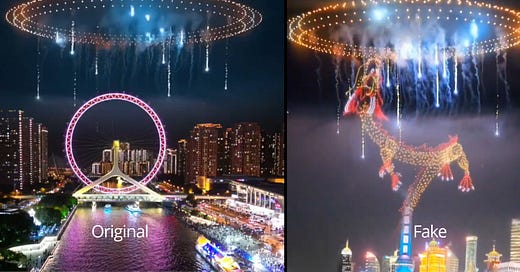Shanghai dragon video: Deception, propaganda or illusion?
A spectacular drone show with a flaming dragon over Shanghai? The Internet is excited - but what if it never happened?
The spectacular dragon video over Shanghai is causing heated debate: Deception, propaganda or pure illusion? The viral clip inspires millions - but a closer look reveals that the truth is often less dazzling than the images.
The viral video: Real or staged?
In the early hours of January 1, a video circulated on social media purporting to show a spectacula…
Keep reading with a 7-day free trial
Subscribe to China Business Spotlight to keep reading this post and get 7 days of free access to the full post archives.




